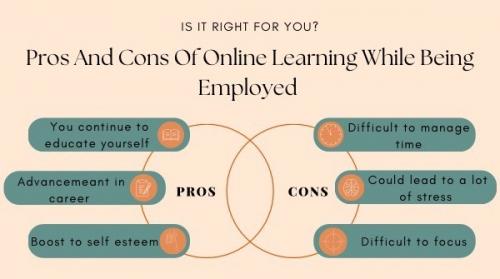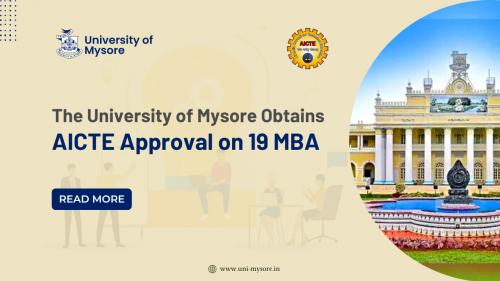Exploring the Pros and Cons: Is an Online Degree the Right Choice for Your Future Career?

With continually advancing technologies, online degree programs are also growing exponentially. E-learning, which became popular out of necessity during the COVID-19 pandemic, has now become an appealing option for studies for many individuals, including working professionals, students, housewives, and education enthusiasts.
However, like any educational pursuit, there are pros and cons to consider before deciding if an online degree is the right choice for your future career.
Pros of Pursuing Online Degree
One of the major advantages of pursuing an online degree is the flexibility it offers. With online classes, you have the freedom to study at your own pace, allowing you to maintain a job or take care of family responsibilities while pursuing your education. Online degrees also eliminate the need for commuting or relocating, saving you time and money.
Flexibility in study pace and scheduling, allowing individuals to balance education with work or family responsibilities.
Elimination of the need for commuting or relocating, saving time and money.
Greater accessibility with more seats available in online degree programs compared to traditional universities.
Wide range of program options catering to various interests and career goals.
Another pro of online degrees is the accessibility they provide. Traditional universities often have limited seats available, making it difficult for some individuals to secure a place in their desired program. Online degree programs, on the other hand, typically have more spots available, giving you a greater chance of being accepted into the program of your choice.
Online degrees often offer a wide range of program options. Whether you're interested in business, healthcare, or technology, there are countless online programs available to cater to your specific interests and career goals. This variety allows you to find a program that aligns with your passions and increases your chances of finding a successful career in your chosen field.
Flexibility in scheduling allows students to tailor their learning around other commitments, such as work or family responsibilities, leading to a better work-life balance.
Cons of pursuing an online degree
While online degrees offer numerous benefits, there are also some drawbacks to consider. One of the main cons is the lack of face-to-face interaction with professors and classmates. In a traditional classroom setting, you have the opportunity to engage in discussions, ask questions, and receive immediate feedback. Online courses, however, often rely on asynchronous communication, which can make it more challenging to build relationships and receive personalized support.
However, the challenge of lack of face-to-face interaction has also been addressed by various universities offering live classes to online students. For example, VTU (Visvesvaraya Technological University), a public state university in Belagavi, Karnataka established by the Government of State, offers online degree courses and real time classes to learners.
- Lack of face-to-face interaction with professors and classmates, leading to challenges in building relationships and receiving personalized support.Various universities are offering live classes eliminating the challenge of no interaction and discussions.
- Decreased motivation and accountability, learners are required to have strong self-discipline and time management skills.Well-designed Learning Management Systems (LMS) and robust student counseling support systems can keep the learners motivated and accountable.
- Some employers may still perceive online degrees as inferior to traditional degrees, potentially impacting job opportunities.Online degree courses offered by entitled universities are accredited and acknowledged worldwide.
Another potential con of pursuing an online degree is the possible decreased motivation and accountability. Without the structure of a traditional classroom setting, it can be easy to procrastinate and fall behind in your coursework. Online students must possess strong self-discipline and time management skills to stay on track and successfully complete their degree.
However, well-designed Learning Management Systems (LMS) and robust student counseling support systems facilitate a conducive learning environment, enabling students to effectively match the required pace and maintain a high momentum of learning
Some employers may still view online degrees as inferior to traditional degrees. While the stigma surrounding online education is diminishing, it's important to consider how potential employers may perceive your degree when applying for jobs. Research the industry you're interested in and determine if an online degree is widely accepted and respected in that field.
However, with the arrival of Govt recognized universities offering accredited degrees, the issues of relevancy and objectivity have also been addressed
Online Degree Programs and Accreditation
When considering an online degree program, it's crucial to ensure that the institution and program are accredited.
Accreditation ensures that the program meets certain quality standards and that the credits earned will be recognized by other institutions or employers.
Research the accreditation status of the institution and program you're interested in to ensure that you're investing in a reputable and recognized education.
How to Choose the Right Online Degree Program
Choosing the right online degree program requires careful consideration of several factors.
Start by identifying your career goals and determining which field of study aligns with your interests and aspirations.
Research different programs and compare their curriculum, faculty, and support services.
Look for testimonials or reviews from current or past students to gain insight into the program's strengths and weaknesses.
Additionally, consider the program's flexibility, cost, and potential for networking and internships.
By thoroughly evaluating these aspects, you can make an informed decision and choose a program that best suits your needs.
Online Degree vs. Traditional Degree: A Comparison
Deciding between an online degree and a traditional degree can be a difficult choice. Both options have their advantages and disadvantages, and the decision ultimately depends on your personal circumstances and preferences.
Traditional degrees offer the benefits of face-to-face interaction, networking opportunities, and a structured learning environment.
On the other hand, online degrees provide flexibility, accessibility, and the ability to balance work and family responsibilities.
Consider your learning style, career goals, and lifestyle when deciding which format is the right fit for you.
In conclusion, pursuing an online degree programs can be a viable option for individuals seeking flexibility, accessibility, and a wide range of program options. However, it's important to weigh the pros and cons before making a decision. Consider factors such as your learning style, career goals, and the reputation of online degrees in your desired industry. Research and choose a reputable online degree program that aligns with your interests and aspirations. With careful consideration and dedication, an online degree can be the right choice for your future career.
If you're considering pursuing an online degree, take the time to thoroughly research and evaluate different programs to ensure you make an informed decision. Reach out to current or past students to gain insight into their experiences and success stories. By choosing the right online degree program, you can set yourself up for a successful future career.











Comments